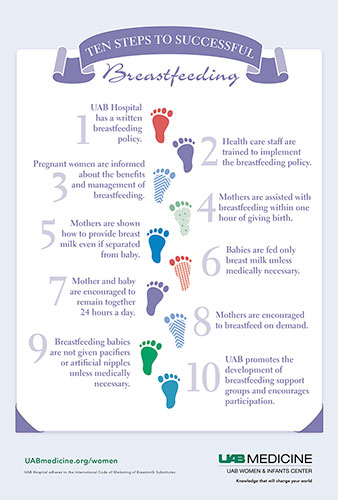 New mothers can enjoy private lactation rooms with one-on-one care at UAB's lactation room at Women and Infants Center. For new mothers, breastfeeding is often an experience that fosters a multitude of feelings, including anxiety, anticipation, fear and excitement. At the Women and Infants Center at the University of Alabama at Birmingham, registered nurses certified by the International Board of Certified Lactation Consultants and a team of nurses specializing in maternal and infant care aim to help mothers navigate breastfeeding and bond with their newborns in a compassionate environment.
New mothers can enjoy private lactation rooms with one-on-one care at UAB's lactation room at Women and Infants Center. For new mothers, breastfeeding is often an experience that fosters a multitude of feelings, including anxiety, anticipation, fear and excitement. At the Women and Infants Center at the University of Alabama at Birmingham, registered nurses certified by the International Board of Certified Lactation Consultants and a team of nurses specializing in maternal and infant care aim to help mothers navigate breastfeeding and bond with their newborns in a compassionate environment.
With a full-service lactation center in the Mother Baby Unit of UAB Hospital’s Women and Infants Center, part of the initial process is focused on educating mothers on the benefits of breastfeeding for their baby and themselves, and helping to guide them through any questions and apprehensions they and/or their partner may have.
“As a Baby Friendly®-accredited hospital, we strive to provide optimal care for breastfeeding mothers, helping them through every step of the way while in the hospital, and in the days and weeks postpartum,” said Anna Koopman, R.N., lactation consultant in UAB’s Women and Infants Center. “We understand and acknowledge all aspects of breastfeeding, from its intimacy to its challenges, and work individually with each mother to help foster a connection with her baby that stimulates breastfeeding.”
At UAB Hospital, the lactation team shares one common goal — to increase initial breastfeeding rates. Lactation consultants say it is important to literally and figuratively hold the hand of all new mothers as they begin nursing. They do this by encouraging the initial feeding within the first hour of life and by giving mothers the confidence, information and skills needed to successfully breastfeed their child.
UAB’s overall breastfeeding rate is 82 percent, meaning the majority of mothers begin breastfeeding before leaving the hospital. The lactation team is proud of this statistic and hopes it continues to grow.
“There are tremendous benefits to breastfeeding on a both a biological and emotional level,” Koopman said, “and we feel a particular responsibility to support these women and educate them that breastmilk is the best source of nutrition for infants.”
 Click to enlargeThe American Academy of Pediatrics recommends mothers provide breastmilk exclusively for their baby for at least the first six months of life, followed by the introduction of complementary foods and continued breastfeeding until the baby is at least 12 months old. Breastfeeding benefits for babies are linked to lower risks of respiratory infections, diabetes, obesity, cancer and Sudden Infant Death Syndrome.
Click to enlargeThe American Academy of Pediatrics recommends mothers provide breastmilk exclusively for their baby for at least the first six months of life, followed by the introduction of complementary foods and continued breastfeeding until the baby is at least 12 months old. Breastfeeding benefits for babies are linked to lower risks of respiratory infections, diabetes, obesity, cancer and Sudden Infant Death Syndrome.
Benefits to mothers include lower risks of breast cancer, Type 2 diabetes, ovarian cancer and the potential for her to immediately lose the weight she gained during pregnancy.Benefits aside, breastfeeding can be an experience that some mothers find easy and enjoyable, while others struggle with latching and bonding, as common fears about their baby’s getting enough nutrition take over. Many feel isolated and stressed about the feeding process, and that stress sometimes leads to mothers’ choosing to stop breastfeeding.
“What new mothers often do not realize is that their milk fully develops during days three to five of life, often when the family has returned home,” said UAB Newborn Nursery Medical Director DeeAnne Jackson, M.D. “Those first few days can be trying and confusing, and our team aims to make sure these mothers feel supported day by day, as each presents new challenges and excitement. Babies do not come with instruction manuals; but if we can guide new parents through the ups and downs those first few weeks, then we are more than doing our job — we are serving as trusted supporters for these families.”
Serving as resources beyond delivery, UAB’s lactation consultants and pediatricians offer continued services that help mothers navigate feeding best practices, from nursing skin to skin and developing regular feeding patterns, to understanding the world of pumping breastmilk versus latching when a mother returns to work. Should mothers experience pain or infection during breastfeeding, the consultants work with them to clear their milk ducts or find a better latch position for the baby so problems do not persist.
As an employer and community steward, UAB is helping lead the way in lactation awareness by supporting its female employees and guests. With more than 14 lactation centers on campus, ranging from employee-only centers to those open to university faculty, staff, students and visitors, these spaces give women a safe, clean and private space to breastfeed naturally or pump.
“We want people across the UAB community to know that we are here to support them and serve as advocates for them as they continue to breastfeed,” Jackson said. “The transition back to work can already be a stressful one for many women, and we hope we can play a small role in helping to ease that anxiety.”